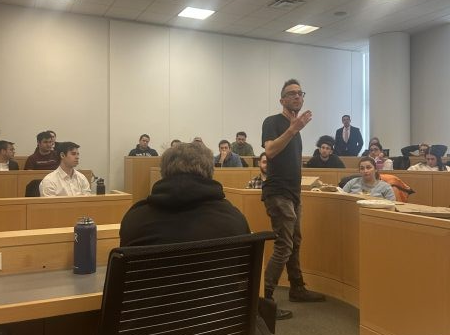Before his speech at the Lincoln Center campus yesterday, the Fordham Jewish Law Students Association asked Israeli-born Columbia professor Shai Davidai if he’d like to use the back door to avoid harassment by the protestors. He declined: “Jews are done using the back door.” In an era where open discourse is more often than not met with hostility, Davidai’s controversial visit to Fordham University exemplifies the importance of intellectual valor.
Only four protestors out of the 50 attendees, wearing black masks and keffiyehs adorned with the Palestinian flag, showed up to the event. Before his speech, he went up to one and thanked him for coming. Yet they periodically rose from their seats and disrupted his speech with chants of “Shame on you and shame on Fordham!” Davidai tried to engage in dialogue but they flatly refused, one saying, “I do not want to have a conversation.” In his speech, Davidai said: “If they want to see you as hateful, they will see you as hateful, and if they see you as hateful, they won’t have to listen.”
In an interview on Monday, Davidai elaborated on this central issue with his detractors. A proud Zionist, he has been bombarded with an onslaught of baseless accusations by Fordham Students for Justice in Palestine (SJP), labeling him a “predator,” a “harasser” and a threat to students. These accusations, fueled by anti-Zionist sentiment rather than factual evidence, do not aim to challenge his ideas. They aim to silence his voice.
Leading up to Davidai’s appearance at Fordham, there was a severe backlash from SJP. “The whole point is me coming and having a conversation,” he said. “And if you don’t want to be in conversation with me, you don’t have to be there, right?” The radical anti-Zionist movement, Davidai said, does not seek dialogue but suppression.
Criticism of Zionism — the belief that the Jewish people have a right to their own state — is often veiled as legitimate political discourse. However, Davidai argues that the line between anti-Zionism and antisemitism is non-existent. “Anti-Zionism is the movement against Jewish self-determination,” he said. “If you oppose the Jewish right to self-determination but not other people’s right to self-determination, you’re being antisemitic.”
SJP’s reaction to Davidai is not unexpected. He has referred to the organization as “terrorist supporters” based on their public endorsement of U.S.-designated terrorist organizations such as Hamas and Hezbollah. He points out that these groups do not simply advocate for Palestinian self-determination but actively call for the extermination of Jews: “They openly say, ‘We support the armed resistance.’” His stance is not unwarranted aggression, as it is portrayed by SJP. It is self-defense against those who romanticize violent extremism.
Davidai’s appearance at Fordham underscores the much broader battle for academic freedom. He stands against a movement that chooses to vilify, de-platform and silence instead of engaging in discussion. Davidai chooses the front door in the face of SJP because he sees opposition not as something that should be closed off, but opened.
Kingsley Marin, GSB ’28, is a finance major from Los Angeles, California.
Editor’s Note: This article was published in tandem with “Balancing Students’ Safety and Free Speech.”










































































































































































































